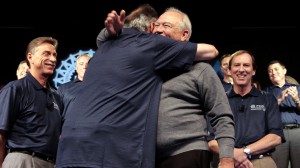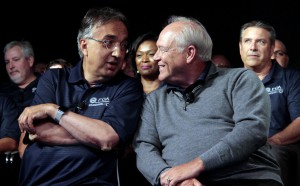
FCA Chief Executive Sergio Marchionne and UAW President Dennis Williams share an impromptu hug to kick off contract talks between the two parties.
A potentially contentious round of contract negotiations between the FCA U.S. and the United Auto Workers opened with a friendly ceremonial handshake and a hug between FCA Chief Executive Sergio Marchionne and UAW President Dennis Williams. The pair then launched into a rundown of the key issues facing bargainers.
Williams said that the UAW would not back away from its goal of closing the gap between first- and second-tier workers of which Chrysler has more than any other automaker. “Base wages have stagnated,” Williams said, adding new employees hired in at entry rate feel like second-class citizens. Profit sharing has helped, he said.
UAW Vice President Norwood Jewell said while the stakes are high with this round of talks, FCA U.S. has come a long way since the recession.
“We know the decisions we make at these talks will affect American families and the nation’s manufacturing health for years to come,” Jewell said. “UAW members worked hard for this day. It’s time to bridge the gap for all working people to a shared prosperity.”

FCA's Sergio Marchionne and UAW's Dennis Williams share a laugh during the ceremony kicking off this round of contract talks.
Gary Shagena, FCA vice president of labor relations, said the company still faces daunting competition.
Marchionne, who sported an untucked blue polo shirt with UAW-FCA logo rather than his customary sweater for the ceremony, noted that the collaboration between the UAW and FCA has been highly successful and led to the creation of 10,000 new jobs and North American profit of $3.5 billion in 2014.
(GM, UAW “in it together” as they kick off contract talks. For more, Click Here.)
“I am optimistic we’ll get to a mutually beneficial conclusion,” said Marchionne, who noted the company and union have a common goal. The close collaboration between the company and union produced more than $11 billion for VEBA trust that now pays the health-care bills for the company’s blue-collar retirees at a time when many observers believed the old Chrysler Group was worth “three sticks of gum and a roll of pennies.”
(For an in-depth look at the 2015 UAW-Big Three contract talks, Click Here.)
But he also emphasized that any contract has to be structured in a way that protect the company during a downturn.
(Ferrari’s IPO is just “days away” from getting started. Click Here for more.)
Marchionne also emphasized that while he still believes that a consolidation is necessary in the auto industry, none of the mergers he has contemplated, including one with GM, would eliminate blue-collar jobs.
